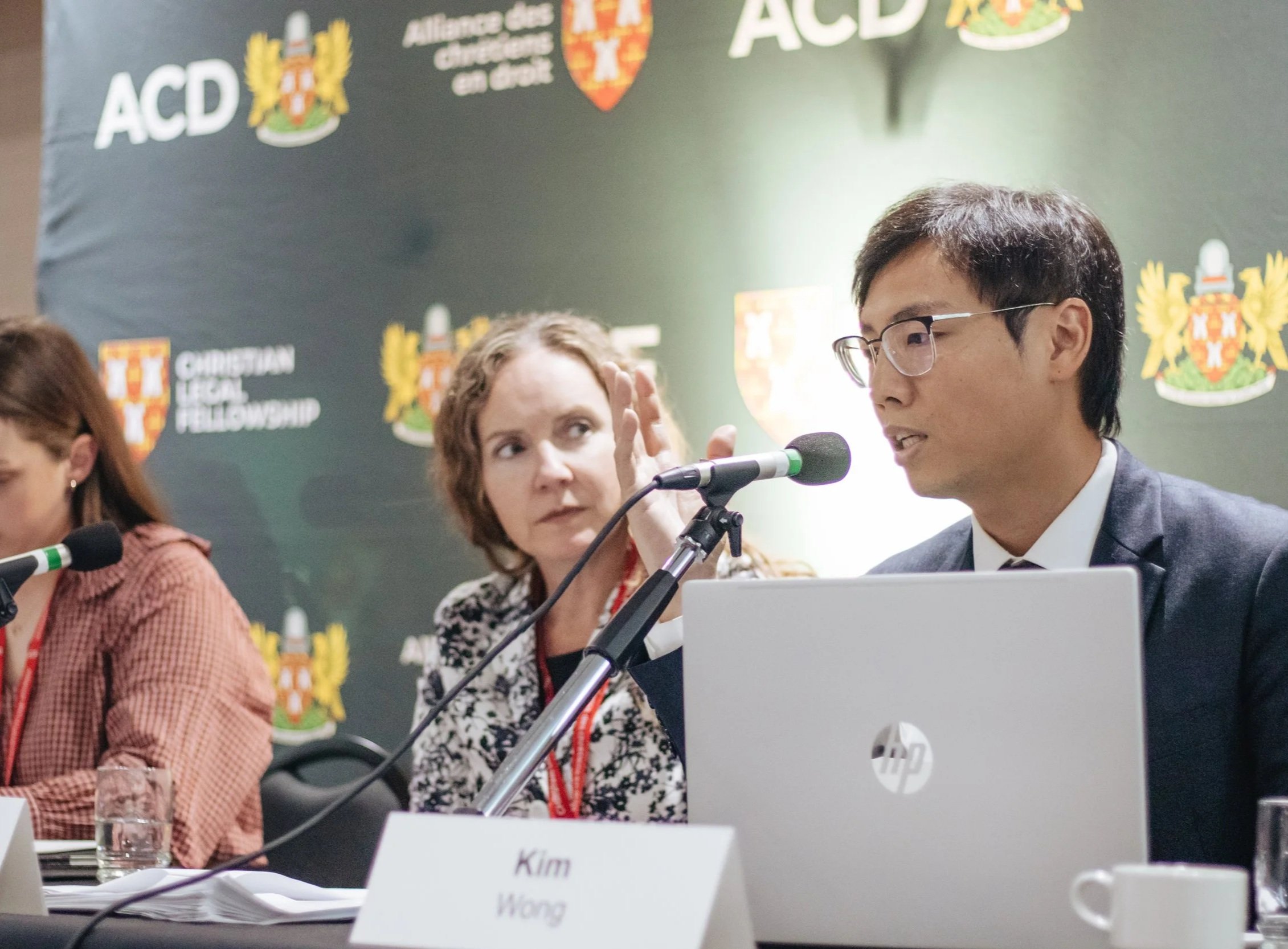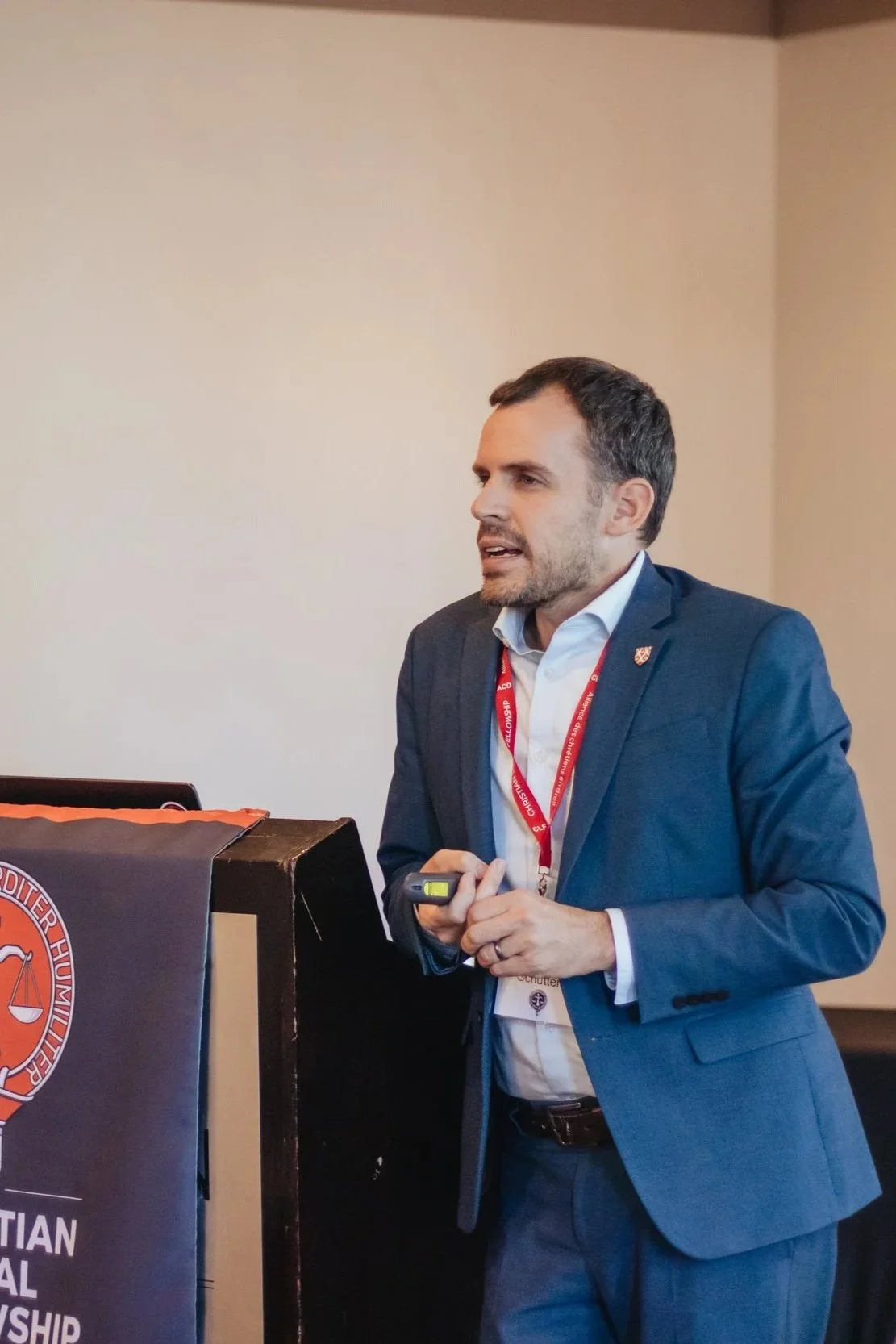by Apara Grace, JD Candidate 2026, Robson Hall CLF President
Introduction
The 2025 Christian Legal Fellowship (CLF) National Conference took place in Mississauga, Ontario, from September 25 to 28, welcoming over 150 lawyers, law students and members of the bench. For the first time this year, the National Conference was immediately followed by the Christian Legal Institute (CLI) Capstone, a special National event for CLI alumni and CLF law student chapter leaders.
The sessions over the weekend delved into themes ranging from academic analyses of current legal issues to equipping attendees with tools to practice law faithfully. Each session offered powerful insights into how we, as Christian legal professionals, can serve God through our vocation.
Academic Sessions
The academic sessions invited attendees to reflect on how our faith can inform our approach to the practice and study of law. They also offered a rich exploration of how Christian principles intersect with Canadian law and policy.
Justice David Brown, formerly of the Ontario Court of Appeal, spoke on, “The Charter’s Preamble: Signposts in a Strange Land of Judicial Accountability”. Drawing from his experience on the bench, Justice Brown examined the role of the judiciary, the proper exercise and limits of judicial power, as well as judicial accountability. He dissected the phrase “the Supremacy of God,” ultimately concluding that the Preamble highlights two virtues essential to the exercise of power. The first is the Rule of Law, which mandates constrained authority, and the second is humility, which reminds officeholders that they are (fallible) human beings and not gods. Justice Brown’s reflections underscored a central theme of the weekend that humility and accountability are essential in our justice system.
This lens proved critical in Terrance Carter’s “Essential Charity and Not-For-Profit Law Update”, which outlined current developments in charity law. He addressed pressing issues, including proposed Income Tax Act amendments that would remove “advancement of religion” as a charitable purpose. Terrance highlighted the role of Christian lawyers in advocating on this issue, given its impact on faith-based organizations’ capacity to serve the public good.
André Schutten, Derek Ross, and Vivian Clemence echoed a similar call to action. Their presentation outlined the various matters CLF has addressed over the past year and also previewed those to come. The CLF team emphasized the importance of our advocacy for freedom of religion and conscience, as well as our critical role as bridge-builders who can provide education to our communities on how current issues are likely to affect people of faith.
Professional Development Sessions
The Conference also included a number of professional development sessions, which focused on how Christian lawyers can practically manage life and legal practice, with faithfulness and conviction.
The Conference opened with a panel on “Guarding Against Mental Unwellness and Burnout in the Practice of Law”, featuring Melanie Bueckert, Winston Sayson and Evelyn Perez Youssoufian, moderated by Crystal Law Sinke. In a culture which often glorifies overwork and busyness, this panel provided refreshing and countercultural wisdom on integrating faith, well-being, and excellence. The panelists shared candid reflections on balancing professional demands with personal obligations and community service. One of my main takeaways from this session was that “work-life balance” is a misnomer, and rather “work-life integration” is a feasible and sustainable goal. Evelyn’s discussion of setting boundaries, establishing priorities and advocating for oneself stood out to me and resonated deeply, particularly as I prepare to transition into legal practice. Law school has taught me to advocate for clients, but not always for myself, and this session offered practical and balanced guidance.
Justice Paul Jeffrey’s “Judicial Perspectives” presentation drew on his extensive experience on the bench, offering advice on preparation, collaboration and strategy in trial work. This presentation gave strong emphasis on integrity and humility in advocacy, which set the tone for many other sessions throughout the weekend.
“Across these sessions, a recurring message emerged: that lawyering, when approached faithfully, is not about striving for control, but about living with integrity and dependence on Christ alone.”
In their panel discussion on “Serving Religious Clients: Developing a Culturally Competent Practice", Pamela Shin and Adrian Miedema explored how we as lawyers can better understand our religious clients’ unique needs and experiences, and translate those considerations to the courts and others when advocating on their behalf.
These themes carried over to a panel featuring Stacey Huxtable and Kim Wong, moderated by Vivian Clemence, on “The Christian Lawyer’s Calling to ‘Do Justice.’” The discussion centred on the biblical meaning of justice and the importance of access to justice for members of marginalized communities. The panellists emphasized helping vulnerable individuals navigate the justice system while maintaining professional objectivity, echoing Justice Jeffrey’s reminder that empathy and objectivity are not opposites but complementary virtues in faithful lawyering and effective advocacy.
These ideas were also prominently discussed in Michael Schutt’s session on “Redeeming Law: A Christian View of Lawyering, Leisure, and Vocation”. Here, Michael explored how Christians are called to multiple vocations: being servants, stewards, and instruments of God’s work. He also outlined the relationship between work and leisure as two facets of how we bear God’s image. Michael defined leisure as activity undertaken for its own sake and suggested that sloth, not leisure, is the true opposite of work. His reflections on leisure as a commandment and on discerning whether our pastimes cultivate virtue or distraction were profoundly impactful. They reminded attendees that rest and delight in God’s creation are integral to a healthy and sustainable professional life.
“... faithful lawyering is not a matter of grand gestures, but of consistent obedience, humility, and courage in the ordinary, by God’s grace and for His glory. ”
A Powerful Testimony of Faith
The keynote address at the Celebration Banquet was delivered by Philip and Robyn Serez, on “The Second Life: The Terrifying Delight of Losing Everything”. The Serezes shared a powerful testimony of tremendous loss and tremendous gain since Philip was diagnosed with ALS in 2020.
Philip shared of the counterintuitive joy that burns deep in the face of tragedy, through trust and surrender to God: “I’ve lost all control, but I’ve gained his sustaining presence. I’ve been forced to decrease, but I’ve experienced him increase in every part of my life.”
The Serezes encouraged listeners to set themselves firm on the Rock, for otherwise, any hope, faith, and peace gets washed away with the sand the moment stormwaters rise. Despite the circumstances, Philip testified to his lightness of being and peace. He noted that “better policies and laws cannot produce divine peace, comfort, and joy”, as he urged us not to compartmentalize our faith from our work. This powerful address reminded us of our greatest offering as we care for others: spiritual transformation through following Jesus.
Christian Legal Institute Capstone
The CLI Capstone further provided direct professional development for law students. In her session “How to Write an Excellent Law School Paper (and Maybe Even Get It Published!)”, Melanie Bueckert shared practical writing and research strategies drawn from her experience as Legal Research Counsel at the Manitoba Court of Appeal. She encouraged the pursuit of excellence, both in service to the profession and in honour to God.
Dr. Ewan Goligher and André Schutten discussed pressing legal issues about human rights in Law and Bioethics. Capstone attendees also grappled with the moral dimensions of R v Dudley and Stephens (1884) in Michael Schutt’s “Worldview in a Lifeboat” presentation. Through this infamous case, Michael examined key principles and assumptions in the court’s decision. This presentation engaged deeply with the issues beyond what is taught in law school, inviting discussion on the roots of our desire for justice and morality, all from a Christian perspective. Taken together, these sessions reminded attendees that legal reasoning is not value-neutral, and that Christian lawyers are uniquely positioned to bring both intellectual clarity and moral conviction to the legal questions impacting Canadian society.
The session “Engaging Your Law School”, led by Vivian Clemence (followed by an extended Q&A with the CLF staff), encouraged student leaders to bring peace, unity, and Christian community to their law schools through service, hospitality, and thoughtful dialogue. This session reminded students of the many opportunities for ministry and connection in their classrooms and workplaces, through the simple ways we engage with those around us daily.
“These national events have truly been a homecoming; each time, I am welcomed with open arms and leave with a true sense of belonging, knowing that God has a plan for me in this field and that I am not alone as I journey in this career.”
The weekend concluded with an inspiring address by Heidi deVries on “Routine Faithfulness: Law, Justice, and Civil Service”. Reflecting on her experiences in municipal law, Heidi’s testimony demonstrated the power of choosing faithfulness in the small things and how God honours steadfastness even when it runs counter to cultural pressures. Her reflections served as a powerful reminder that success in law should not be measured by recognition or position, but by faithfulness and character.
Personal Reflection
As a first-generation law student and professing Christian, law school initially felt like a foreign land where I had no roadmap, no support, and no connections. The feeling of being “other” as I did not conform to the lifestyle and beliefs held by my peers was very intrinsic until I was able to connect to other Christians in law through CLF. Since then, I’ve had the privilege of attending numerous CLF conferences and the CLI, where I have found mentorship from Christian lawyers and formed meaningful connections with other Christians in law from across Canada. These national events have truly been a homecoming; each time, I am welcomed with open arms and leave with a true sense of belonging, knowing that God has a plan for me in this field and that I am not alone as I journey in this career.
The 2025 CLF National Conference was a huge blessing for me as I continue to discern the type of lawyer I want to be, and how to walk faithfully in a career that is often all-consuming. Across these sessions, a recurring message emerged: that lawyering, when approached faithfully, is not about striving for control, but about living with integrity and dependence on Christ alone. I carry away two key messages: (1) my worth is not defined by output or prestige, but by obedience and stewardship, and (2) rest is a spiritual discipline, not an indulgence. Heidi deVries’ testimony grounded both lessons in lived experience: that steadfastness in daily work, even when unseen, is one of the clearest testimonies of faith in the legal profession.
As I look ahead to entering practice, I am challenged to pursue excellence without idolizing achievement, and to view each task, client, and decision as an opportunity to serve God and love my neighbour. These sessions collectively reminded me that faithful lawyering is not a matter of grand gestures, but of consistent obedience, humility, and courage in the ordinary, by God’s grace and for His glory.
Apara Grace is a 2026 J.D. Candidate at the University of Manitoba Faculty of Law (Robson Hall). She graduated with a Bachelor of Science with a double major in Biology and Biochemistry from the University of Winnipeg. Apara currently serves as President of Robson Hall CLF and as Co-Chair of both the Manitoba Law Students’ Association Professional Development Committee and the Interfaith Committee. She has previously worked as a Student Research Intern with CLF, a Core Editor for the Manitoba Law Journal and recently completed her term as a 2L summer student at Taylor McCaffrey LLP, a leading law firm in Manitoba.
Outside of school, Apara has a passion for creativity and runs a small business. She also enjoys being involved in her local church community, Formula One and spending time with friends and family.
Special thanks to Elsie Abang and Shubila K Photography





















































